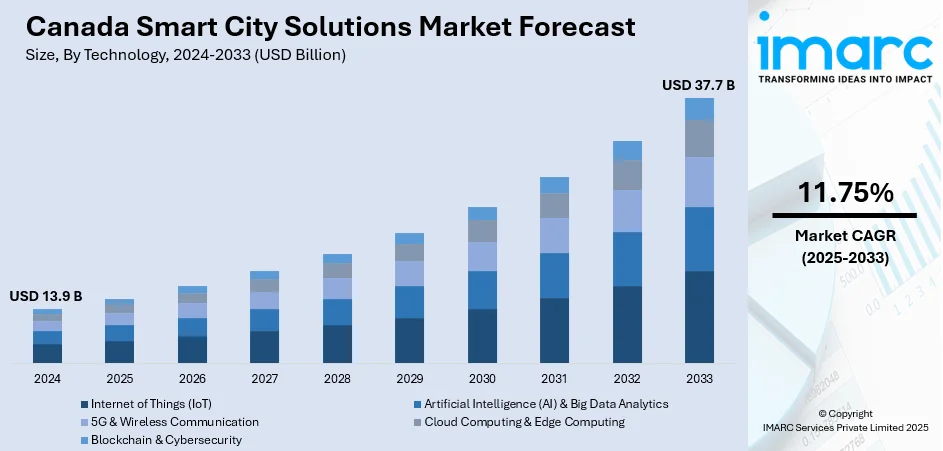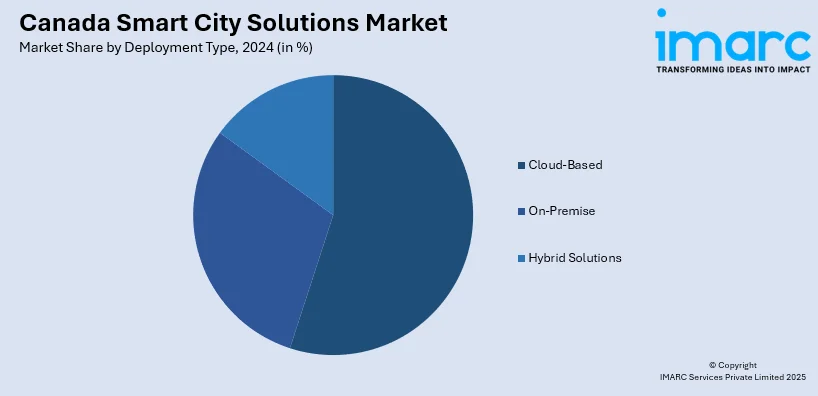
Canada Smart City Solutions Market Size, Share, Trends and Forecast by Technology, Deployment Type, Application Area, and Region, 2025-2033
Canada Smart City Solutions Market Overview:
The Canada smart city solutions market size reached USD 13.9 Billion in 2024. Looking forward, IMARC Group expects the market to reach USD 37.7 Billion by 2033, exhibiting a growth rate (CAGR) of 11.75% during 2025-2033. The market is propelled by numerous government initiatives and funding for smart infrastructure development, increasing urbanization and need for efficient city management. Moreover, the growing demand for sustainable and energy-efficient technologies, and rising adoption of IoT and data analytics for real-time decision-making are increasing the Canada smart city solutions market share.
|
Report Attribute
|
Key Statistics
|
|---|---|
|
Base Year
|
2024
|
|
Forecast Years
|
2025-2033
|
|
Historical Years
|
2019-2024
|
| Market Size in 2024 | USD 13.9 Billion |
| Market Forecast in 2033 | USD 37.7 Billion |
| Market Growth Rate 2025-2033 | 11.75% |
Canada Smart City Solutions Market Analysis:
- Major Drivers: Urbanization, sustainability goals, Intent of Things (IoT) expansion, fifth generation (5G) networks, infrastructure upgrades, and supportive government initiatives drive demand for smart city solutions, encouraging public‑private collaboration to enhance efficiency, connectivity, and quality of urban services across Canada.
- Key Market Trends: Increased use of artificial intelligence (AI), Internet of things (IoT), and big data for urban service automation, emphasis on cybersecurity, inclusive citizen engagement, open data governance, and integration of smart mobility, energy, and public safety systems are some of the key Canada smart city solutions market trend.
- Market Opportunities: Growth in digital infrastructure, smart mobility, energy optimization, public safety technologies, and urban analytics offers opportunities for innovators, fostering collaboration between technology providers, municipalities, and stakeholders to enhance city operations and livability.
- Market Challenges: Based on the Canada smart city solutions market analysis, the high implementation costs, integration complexity, privacy concerns, cybersecurity threats, unequal municipal readiness, and the digital divide in remote regions pose challenges to developing inclusive, sustainable, and secure smart city ecosystems nationwide.
Canada Smart City Solutions Market Trends:
Government Initiatives and Investments in Smart Infrastructure
The Canada smart city solutions market growth is primarily driven by strong governmental support and investments in smart infrastructure development. The Canadian government, through initiatives such as the Smart Cities Challenge, has encouraged municipalities across the country to adopt innovative technologies aimed at improving the quality of urban life. The programs distribute funds combined with resources to enable projects that boost city management alongside public service delivery and transportation systems and sustainability initiatives. The elevated government commitment to life quality improvement and sustainability adoption throughout sectors has led to increased funding of smart technology systems. These solutions include intelligent traffic management systems, renewable energy solutions, and connected urban infrastructure. The growth patterns in Canada's government sector are driven forward by public services enhancements through technological commitments from federal and provincial levels. The increased government funding seeks to implement data-driven digital solutions for improving municipal operation efficiency. The ongoing smart city initiatives are pushing market demand up by creating conditions that welcome private sector investment and technological development in this field.

To get more information on this market, Request Sample
Increasing Urbanization and the Need for Efficient City Management
Rapid urbanization in Canada is vital in shaping smart city solutions market. According to the World Bank Group, 82% of the population in Canada lives in urban areas. As cities grow, the pressure on infrastructure, transport, energy, and public services grows, necessitating more efficient and sustainable management systems. Smart city technologies provide a means of responding to the challenges of urban expansion by facilitating improved resource management, traffic flow, energy efficiency, and public safety. For example, smart sensors and IoT devices can be employed to track and optimize energy consumption, water supply, and waste management in real time. Further, smart transportation systems, including traffic monitoring and adaptive signal control, reduce congestion and enhance mobility in ever-denser urban areas. The convergence of these technologies makes cities more efficient, lowers operational expenses, and raises the standard of living for urban dwellers. As more Canadian cities experience population growth and urban expansion, the demand for smart solutions that can help manage these complexities is rising, creating a positive Canada smart city solutions market outlook.
Rising Focus on Sustainability and Energy Efficiency
Sustainability and energy efficiency are becoming major concerns for Canadian towns and cities, which is driving the market for Canada smart city solutions market growth. There is a growing awareness about climate change and the environmental impact of urbanization, due to which there is increasing pressure on cities to adopt green technologies to lower CO2 emissions and increase renewable energy utilization. As per Reuters, estimated carbon emissions for 2023 in Canada totaled 702 Million Metric Tons, a 1% decrease from the previous year. In Smart cities, smart grid monitoring systems, energy-efficient street lighting, and green building technologies offer significant tools for the conservation of energy and enhancement of environmental sustainability. The rising need for implementing energy-efficient technologies now requires attention because Canadian cities must reach sustainability targets at the national and international level. This is driving investment in smart infrastructure projects to help create greener, more eco-friendly urban environments. Consequently, this growing focus on sustainability and energy efficiency is creating a favorable outlook for the smart city solutions market in Canada as cities strive to become greener and more resilient to climate challenges.
Canada Smart City Solutions Market Segmentation:
IMARC Group provides an analysis of the key trends in each segment of the market, along with forecasts at the regional level for 2025-2033. Our report has categorized the market based on technology, deployment type, and application area.
Technology Insights:
- Internet of Things (IoT)
- Artificial Intelligence (AI) & Big Data Analytics
- 5G & Wireless Communication
- Cloud Computing & Edge Computing
- Blockchain & Cybersecurity
The report has provided a detailed breakup and analysis of the market based on the technology. This includes the internet of things (IoT), artificial intelligence (AI) & big data analytics, 5G & wireless communication, cloud computing & edge computing, and blockchain & cybersecurity.
Deployment Type Insights:

- Cloud-Based
- On-Premise
- Hybrid Solutions
A detailed breakup and analysis of the market based on the deployment type have also been provided in the report. This includes cloud-based, on-premise, and hybrid solutions.
Application Area Insights:
- Smart Transportation & Mobility
- EV Charging
- Smart Traffic Management
- Public Transit
- Smart Energy & Utilities
- Smart Grids
- Renewable Energy Integration
- Energy Efficiency
- Smart Buildings & Infrastructure
- Automated Systems
- Sustainable Construction
- Green Buildings
- Smart Governance & Citizen Services
- E-Governance
- Public Safety
- Digital Identity
- Smart Healthcare
- Telemedicine
- AI-powered Diagnostics
- Emergency Response Systems
- Smart Waste Management
- AI-Based Recycling
- Automated Waste Collection
A detailed breakup and analysis of the market based on the application area have also been provided in the report. This includes smart transportation & mobility (Ev charging, smart traffic management, and public transit), smart energy & utilities (smart grids, renewable energy integration, and energy efficiency), smart buildings & infrastructure (automated systems, sustainable construction, and green buildings), smart governance & citizen services (e-governance, public safety, and digital identity), smart healthcare (telemedicine, ai-powered diagnostics, and emergency response systems), and smart waste management (ai-based recycling and automated waste collection).
Regional Insights:
- Ontario
- Quebec
- Alberta
- British Columbia
- Others
The report has also provided a comprehensive analysis of all the major regional markets, which include Ontario, Quebec, Alberta, British Columbia, and Others.
Competitive Landscape:
The market research report has also provided a comprehensive analysis of the competitive landscape. Competitive analysis such as market structure, key player positioning, top winning strategies, competitive dashboard, and company evaluation quadrant has been covered in the report. Also, detailed profiles of all major companies have been provided.
Latest News and Developments:
- In April 2024, Careerminds, a global outplacement and career‑development services provider, announced its acquisition of Toombs, a respected Canadian outplacement firm founded in 1990. Toombs serves clients across oil and gas, energy, manufacturing, education, healthcare, and public sectors. Careerminds President Raymond Lee emphasized the shared commitment to exceptional client experiences and growth in Canada. Toombs President Mark Toombs highlighted the synergy of Careerminds’ global capabilities with Toombs’ strong local presence.
Canada Smart City Solutions Market Report Coverage:
| Report Features | Details |
|---|---|
| Base Year of the Analysis | 2024 |
| Historical Period | 2019-2024 |
| Forecast Period | 2025-2033 |
| Units | Billion USD |
| Scope of the Report |
Exploration of Historical Trends and Market Outlook, Industry Catalysts and Challenges, Segment-Wise Historical and Future Market Assessment:
|
| Technologies Covered | Internet of Things (IoT), Artificial Intelligence (AI) & Big Data Analytics, 5G & Wireless Communication, Cloud Computing & Edge Computing, Blockchain & Cybersecurity |
| Deployment Types Covered | Cloud-Based, On-Premise, Hybrid Solutions |
| Application Areas Covered |
|
| Regions Covered | Ontario, Quebec, Alberta, British Columbia, Others |
| Customization Scope | 10% Free Customization |
| Post-Sale Analyst Support | 10-12 Weeks |
| Delivery Format | PDF and Excel through Email (We can also provide the editable version of the report in PPT/Word format on special request) |
Key Benefits for Stakeholders:
- IMARC’s industry report offers a comprehensive quantitative analysis of various market segments, historical and current market trends, market forecasts, and dynamics of the Canada smart city solutions market from 2019-2033.
- The research report provides the latest information on the market drivers, challenges, and opportunities in the Canada smart city solutions market.
- Porter's five forces analysis assist stakeholders in assessing the impact of new entrants, competitive rivalry, supplier power, buyer power, and the threat of substitution. It helps stakeholders to analyze the level of competition within the Canada smart city solutions industry and its attractiveness.
- Competitive landscape allows stakeholders to understand their competitive environment and provides an insight into the current positions of key players in the market.
Key Questions Answered in This Report
The smart city solutions market in Canada was valued at USD 13.9 Billion in 2024.
The Canada smart city solutions market is projected to exhibit a CAGR of 11.75% during 2025-2033, reaching a value of USD 37.7 Billion by 2033.
Key drivers of Canada’s smart city solutions market include government support, growing urban populations, and the need for sustainable, efficient infrastructure. Advancements in IoT, AI, and connectivity enable smarter services, while citizen expectations for safety, convenience, and improved quality of life push municipalities toward adopting integrated digital solutions nationwide.
Need more help?
- Speak to our experienced analysts for insights on the current market scenarios.
- Include additional segments and countries to customize the report as per your requirement.
- Gain an unparalleled competitive advantage in your domain by understanding how to utilize the report and positively impacting your operations and revenue.
- For further assistance, please connect with our analysts.
 Request Customization
Request Customization
 Speak to an Analyst
Speak to an Analyst
 Request Brochure
Request Brochure
 Inquire Before Buying
Inquire Before Buying




.webp)




.webp)












